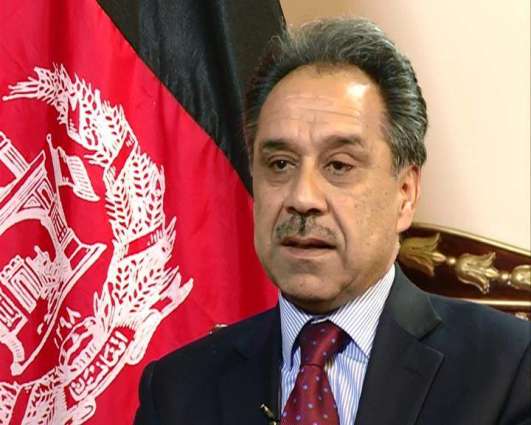Afghan presidential candidate Ahmad Wali Massoud, who is the younger brother of a revered anti-Taliban commander and national hero, told Sputnik that calls for peace in the crisis-affected nation had transformed into a political project and warned against using the prospect of peace as a tool to maintain power
KABUL (Pakistan Point News / Sputnik - 26th September, 2019) Afghan presidential candidate Ahmad Wali Massoud, who is the younger brother of a revered anti-Taliban commander and national hero, told Sputnik that calls for peace in the crisis-affected nation had transformed into a political project and warned against using the prospect of peace as a tool to maintain power.Massoud, an ethnic Tajik, is a prominent figure on the national political stage. A former ambassador of Afghanistan to the United Kingdom, he heads the Massoud Foundation in honor of his brother, the former anti-Soviet and anti-Taliban commander of the Mujahideen movement, Ahmad Shah Massoud.
Known to his supporters as the Lion of Panjshir, Ahmad Shah Massoud led the guerrilla resistance against the Soviet influence over Afghanistan and subsequently started a resistance against the Taliban. He was assassinated by suicide bombers in 2001. The day of his death, September 9th, is marked annually in Afghanistan.
Ahmad Wali Massoud is now running for the presidency as an independent candidate and seeking to secure a five-year term and defy incumbent president Ashraf Ghani. He has repeatedly vowed to take the country out of political and economic crisis if he secured his victory. However, his chances of winning are much smaller than those of Ghani and even Ghani's political nemesis, Abdullah Abdullah.
Dwelling on the prospects for national reconciliation after almost two decades of war, Massoud branded the ongoing peace efforts as a mere political project.
"Peace is a complex issue in Afghanistan, but over the years we see that it has transformed into a project, and with the current government the peace efforts have resulted in a political collision," he stated.
According to the prominent politician, peace "must be national" and help to reach a compromise with all parties and tribes across the country. Massoud also stressed that the process should not be used by the leadership as a tool to remain in power.
"Peace cannot be used to maintain power. First, there should be a national consensus, then a regional, and then an international consensus," he said.
PEACE COMES WITH INTRA-AFGHAN DIALOGUE, NOT US-TALIBAN DEAL
Massoud, who defends his later brother's legacy, believed that all peace deals should be negotiated within Afghanistan, without the foreign interference.
"The [negotiated] deal between the Taliban and the US is an agreement between them and has no links with the Afghan government and the Afghan people. Both [the US and the Taliban] fear each other and want to make a deal that is guaranteed. This agreement does not mean that we reached peace as peace comes at an inter-Afghan dialogue that all parties should compromise," he stated.
That is why the Taliban "should get rid of foreigners" and commit to the intra-Afghan talks, according to the politician.
The peace efforts were dealt yet another blow earlier in September when the United States abruptly halted talks with the Taliban leadership after the group claimed responsibility for a terrorist attack in Kabul that killed a US serviceman. The attack took place on September 2, just hours after US Special Representative for Afghanistan Reconciliation Zalmay Khalilzad had shared with the nation's leadership the details of a peace deal drafted by the Taliban and the United States during the ninth round of talks in the Qatari capital of Doha.
Like his late brother, Massoud has a harsh stance toward the militant group, saying that the organization has "militant traditions in their religion" and "their values can not be combined" with those of the Afghan people.
Pakistan, another player behind the peace efforts in Afghanistan, has not been left unnoticed by the presidential contender. Reacting to Pakistan's commitment to the Afghan peace deal, Massoud said that the problem between the Taliban and Pakistan should be identified. Islamabad has been slammed by critics for swaying over the insurgent group by offering them shelter, if not outright support.
"We should find out the problem between the Taliban and Pakistan. Once the problem is identified, then it is easy to solve it. Besides, the Taliban should also talk with Pakistan," he said.
AFGHANISTAN NEEDS DECENTRALIZED SYSTEM
Massoud lashed out at the incumbent political leadership, saying that Afghanistan needed a decentralized system in which Kabul was not responsible for all decisions.
"The system is full of corruption, the power is concentrated [in the leadership's heads], corruption is the rule, which has not given power to anybody and this system has created a crisis. Afghanistan needs a decentralized system and system capabilities that every governor and minister has authority," he said.
This was another jab directed at Ghani, who is still being questioned over the legitimacy of his coming to power in 2014. Ghani and Abdullah both claimed victory in the tight race and each accused the other of election fraud. Ghani has repeatedly been being accused of corruption, in particular of using the national treasury to finance his 2019 presidential campaign.
Massoud also slammed the incumbent government of failing to provide security to the Afghans, and its lack of advancements in security and defense bodies.
"We must make improvements to the security and defense bodies, that is, to strengthen them in terms of quality and quantity make them strong," he said.
With the September 28 vote drawing closer, the uncertainly over security is a big worry for the Afghan people. Some of them may not turn up at polling places due to safety concerns, a tendency that could lead to a low turnout.




